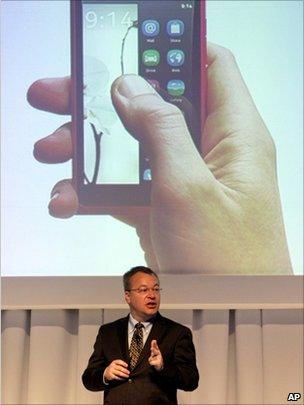Nokia, Harry Potter and media manipulation
- Published
- comments

The 'leak' occurred in the same week that Nokia showed off its N9 handset
In a hyper-connected world where smartphones are always there to snap and tweet news out instantaneously, how easy is it for a company to control the timing of a product announcement?
Two examples this week suggest it's really hard and that reporters have the upper hand - though on closer examination perhaps it's we the journalists who are being manipulated.
The first example involves Nokia, and an apparent leak of the hottest secret in the embattled mobile giant's locker.
Look at this YouTube video, external, featuring the company's boss Stephen Elop. Go to just over a minute in and you will hear the CEO telling the audience to put away their cameras and turn off their recording devices: "This is something super-confidential that we don't want to see out in the blogosphere."
He then proceeds to show off Nokia's first handset running the Windows Phone software, the device on which the company's whole future depends, and something we've been told will not be out until next year.
My first thought on seeing this footage was what a scoop for whoever disobeyed Mr Elop and kept their recording device on. The I realised that the video involves at least two camera angles and had obviously been shot by Nokia itself.
The question then is how it made it onto YouTube. While the account used to upload it also features other material about Nokia phones, it does not appear to be connected to the company.
So did someone mischievous get hold of the footage and then pass it on - or was this a deliberate leak by Nokia? If so, it's rather clever because it all serves to keep something more positive about the firm in the news at a time when it's getting a lot of negative coverage.
'Secret leak'
My other example involves another leak from a event where the audience was told to go offline - and I'm afraid this time I can name the guilty party.
Yesterday morning I headed to the Victoria and Albert Museum for the launch of Pottermore - JK Rowling's latest project. Reporters, cameras and photographers from across Europe were waiting to get into a press conference where JK Rowling was due to give details of her new project.
JK Rowling on Potter and the future of print and digital books
I had gone along, having been briefed that the event would involve some very exciting new technology.
But when the press conference started, we were all ordered to turn off our mobile phones and any electronic equipment - and that anything we learned was embargoed until midday.
There had been nothing about an embargo in the invitation to the press conference. Then the presentation started with Ms Rowling's agent telling us that this was all about reaching a new "digital generation".
I could not believe that you could invite cameras and reporters to a glitzy launch of a "digital" product and then tell them to keep quiet until it suited the Potter empire to release its message.
What's more, though Pottermore looks like a clever move by an author to cut out the middle-man and sell ebooks direct to consumers, the technology involved did not seem particularly ground-breaking,
In a rebellious mood, I kept my phone on, shot a few pictures, and tweeted a quick line about the announcement. I then waited until after the noon embargo time to post my own YouTube video of the event, external.
So was I wrong to break the embargo? A few people accused me of spoiling it for the millions of children waiting for the official announcement at midday, and they may have a point.
But in an electronic age, controlling the flow of information is like ordering the tide to come in a couple of hours late. And now, twenty-four hours on, I'm wondering whether the Potter empire - just like Nokia - might not have been too unhappy to see its "secret" leak a little early.